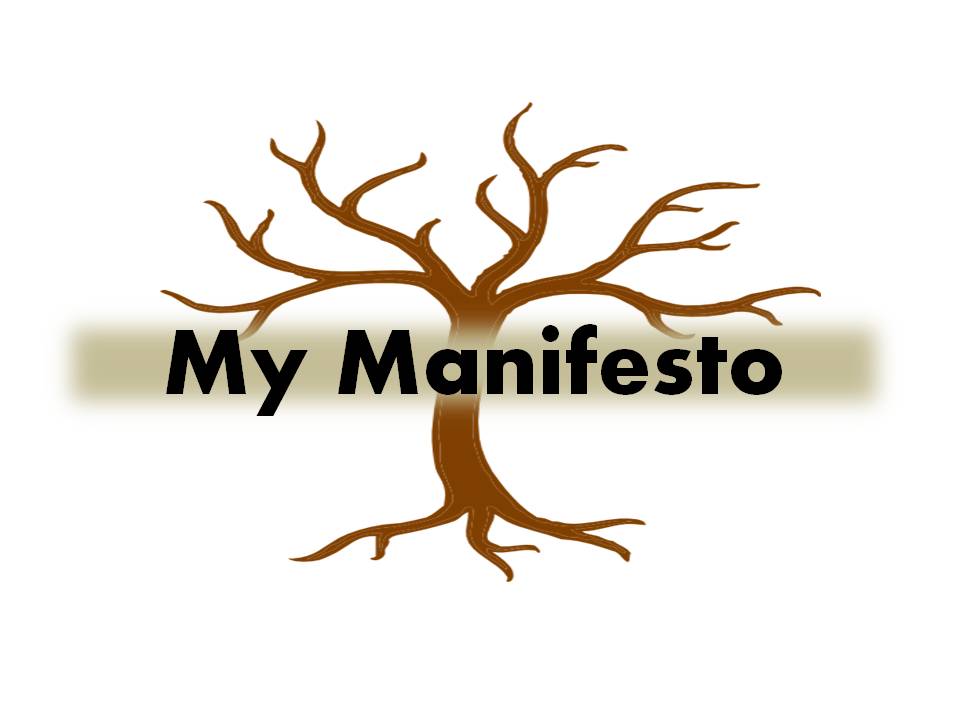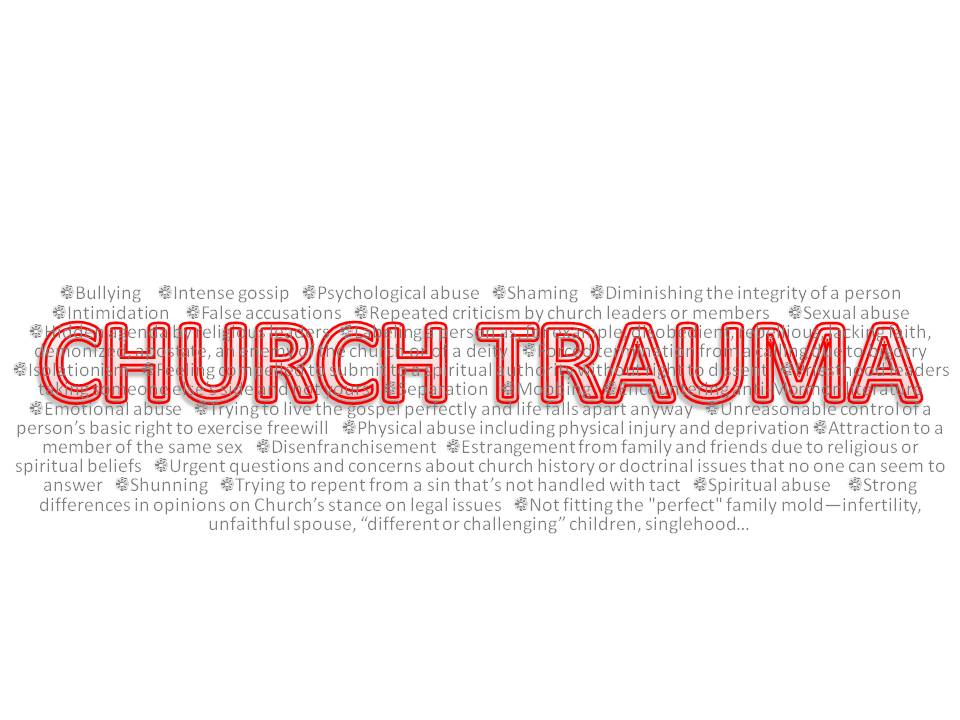How Can the LDS Church Become a Hospital to the Traumatized?
By Danna Hartline
“It’s not that I’m inactive or don’t believe, I just have a hard time going to a ward that treats my family and I like we don’t belong.”
“Before my divorce, I felt like I belonged and felt very content with my church experience. But after divorcing, it was very hard to find my place.”
“I always felt shamed and flawed. I felt like others were happy with church but I couldn’t be me there. I tried so hard to be perfect to achieve the same experiences of others.”
These comments are not unusual for people suffering from church trauma. Church trauma? Isn’t church supposed to be helpful, or at least benign? Surely I am just over exaggerating with such a term. I have been told this for years. Even I didn’t believe such a thing existed at first. When I was traumatized 12 years ago at church, I wasn’t looking for trouble. I wasn’t even doing anything wrong, believe it or not, which is why I was so sideswiped. How could such a thing happen to someone who was trying so hard to live a godly life?
So after I was traumatized, I sought counseling (more than once) to try to get some clarity on what had happened to me. My first therapist quickly identified my condition as trauma—not offense. I would not believe him. So to help resolve my stubborn heart, which simply could not wrap itself around anything but offense (that’s all I’d been taught existed in an LDS Church setting), I was hooked up to a machine so I could witness the damage for myself. My own eyes saw that my mind had been damaged because of how I was treated by a church leader.
Now my therapist didn’t call it “church trauma”–I am quite sure he didn’t have concept of that term, but he recognized that I had been traumatized. And trauma at church can be more shattering than maybe you have ever contemplated. Church is a place that gives one identity, meaning, and purpose. It’s a place we go for safety. It’s a place where we often think our leaders speak and act for God. It is also a place where we do not want to consider church trauma—or hear the voices of those who have been damaged by such “nonsense.” Thus, they are too often silenced and dismissed. It is a subject that is extremely taboo. Maybe we can all agree on that.
Well, this is my work—to help bring forth this sad reality. It is to also bring an understanding to these silenced, misunderstood people. I want to bring healing. I want to bring hope. I want Church members to embrace each other–all of us–all types, all walks, all sufferers, as our Church claims is our mission in ministry. It is the mission of our Savior Jesus Christ.
 To help move this work forward, I recently co-founded a FB group, along with my good friend Tom Irvine, as a gathering place for this group of church trauma sufferers. This is a neat group! It encompasses the fully active, those who have left the Church, and all those in between. We are talking about healing (and seeing it)! We are talking about solutions! We are embracing one another, validating each other’s pains and struggles! It is indeed a support group!!
To help move this work forward, I recently co-founded a FB group, along with my good friend Tom Irvine, as a gathering place for this group of church trauma sufferers. This is a neat group! It encompasses the fully active, those who have left the Church, and all those in between. We are talking about healing (and seeing it)! We are talking about solutions! We are embracing one another, validating each other’s pains and struggles! It is indeed a support group!!
Would you like to hear what this group has to say about church? Would you like to consider what they have to say about what you and I can do to help make church a safer place? Would you like to hear what this group of people feels would help them either remain active or return to the fold? (You see, many are no longer with us because the pain is so real—no, they didn’t leave because of offense, pride, a lack of faith, or a desire to sin–they left because of trauma, which is why MOST leave the Church, despite what you may have been told).
Here is a list we as a group generated. This is what we feel would indeed help truly make the Church a hospital for sinners (that’s you and me):
- Each ward and stake should have an ombudsperson. There should also be a church-wide panel of ombudspersons for more difficult cases. The ombudsperson would be independent of the local priesthood line of authority. (Ombudsperson: “a person who investigates and attempts to resolve complaints and problems as between employees and an employer or between students and a university.”)
- The Church needs a hotline specifically for members where they can call in the case of church trauma or abuse so they can receive much needed guidance, support, and assistance.
- It was suggested that there needs to be a system for temporary but immediate suspension of any leader who has claims of abuse against him. Some within the group saw error or concern with this. Keep in mind all of these ideas are just to get our minds working on how the church can better minister and help the traumatized.
- Sunday lessons need to include topics like abuse, consent, effective coping mechanisms, therapeutic communication, establishing healthy boundaries, respecting privacy, the power and control wheel, how to support someone who has experienced abuse, healthy relationships, and the given and inherent worth of everybody regardless of anything else.
- Wards need action plans in place for helping abused spouses/children. Perhaps the RS presidency could arrange designated safe houses when victims are in transition.
- Information should be posted on bulletin boards about local community resources such as sexual assault organizations, domestic violence groups, women shelters, CPS, children’s advocacy centers, and LGBTQ groups. Such posting would advocate the need to seek help outside of the church. This would help overwhelmed leaders as well of sufferers.
- Women need to be allowed more of a voice in the church. It can be very hard for women who have been traumatized to have to speak to men and go through these channels of authority. It was stated in the group that even the women in auxiliary presidencies have to go to the men for permission to act and if the men are not in support of someone who has been traumatized, the women in position will cease helping a woman because they have been told to do so.
- Pre-marital counseling should be offered for those seeking a temple marriage. Discussions should include what constitutes spousal abuse and in what situations it would be wise to consider divorce. The Church needs to stop seeing those who choose to divorce as covenant breakers. No one leaves a marriage frivolously.
- It was stated that the practice of excommunication needs to be brought to an immediate and screeching halt. For those who have experienced this agony, the Church’s model of a hospital for sinners does not and cannot hold in an environment where if one is “sick enough,” one gets kicked to the curb.
- Adequate training needs to be provided for ecclesiastical leaders—real, academic, science-based training for those who counsel people. Help leaders understand their limitations and to know what is within their ministry and when they need to refer their ward or stake members to real mental health professionals. It was also stated the members should also receive training because we are all ministers. We should all have access to the handbooks and be taught how to minister in the Savior’s way.
- It was voiced that the Church needs more transparency. We need to know we can trust our leaders by being able to view how funds are spent and what our records say. We need to have better access and to be better taught the true events of church history–we need to be taught how to embrace the mess and accept that life is just messy, not always neat, clean, and pretty. But such acceptance doesn’t necessarily need to equal falsity but perhaps greater beauty. Messy examples can show us how the Lord can work with all of us despite shortcomings, screw-ups, and faults.
- Members should be able to go to whatever ward they please. It is very difficult for members who have been traumatized or mistreated by fellow ward members to return to their assigned wards or stakes.
Probably much like you, I care about positive change. I care about these people who are hurting—who have left and those who are trying to stay. This group Tom and I created is about helping fellow strugglers find a safety net post-trauma. And we want to help the Church do the same. Is it possible for church to become a safe place once again? Can the Church really provide a safety net for those who have been traumatized in the very place they sought help and healing? Well, I’m not sure. But I hope with this new era of ministry, we will give it a more valiant effort. To do so, we need to see and hear those that perhaps we have been unwilling to truly “see,” hear, and love. Let us open our hearts and truly strengthen the feeble knees. It’s the only way. If you and I don’t act, if we don’t care enough to recognize and help bring change, who will?
For more information on church trauma, watch this presentation.
 **Danna is the creator of The Mormon Trauma Mama. She is actively involved in advocating for those suffering from church trauma and is currently getting her Master’s degree in Pastoral Counseling from California Southern University. She and her husband have four delightful children.
**Danna is the creator of The Mormon Trauma Mama. She is actively involved in advocating for those suffering from church trauma and is currently getting her Master’s degree in Pastoral Counseling from California Southern University. She and her husband have four delightful children.



